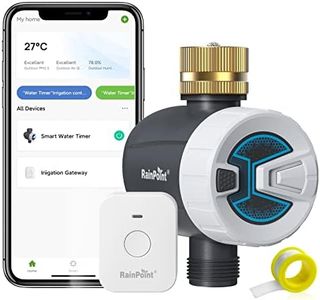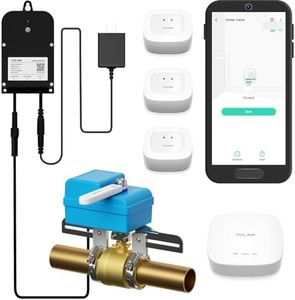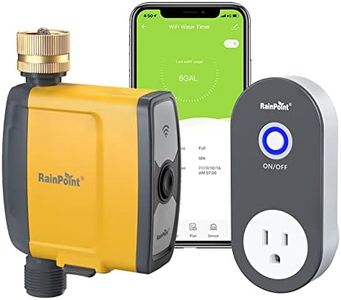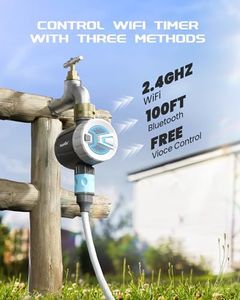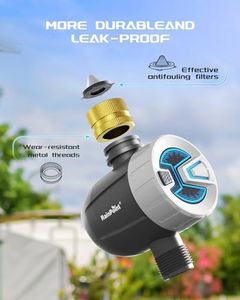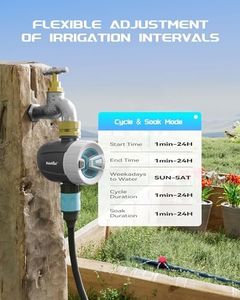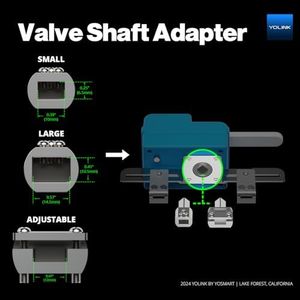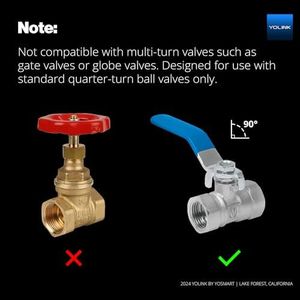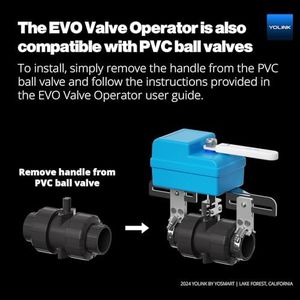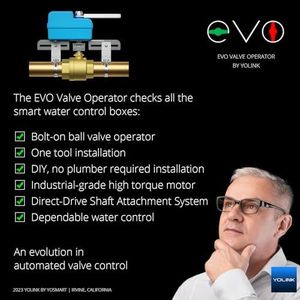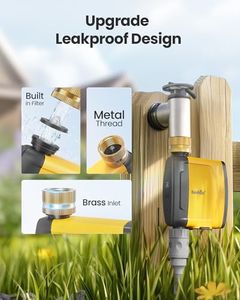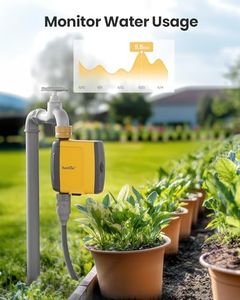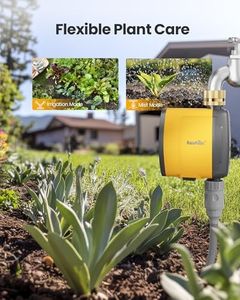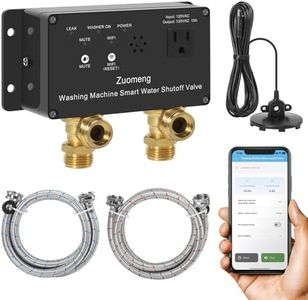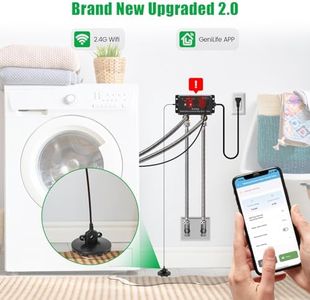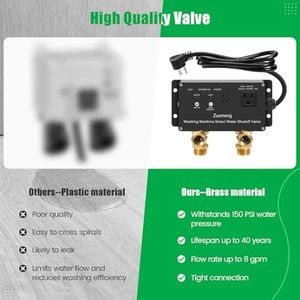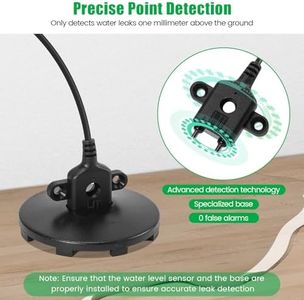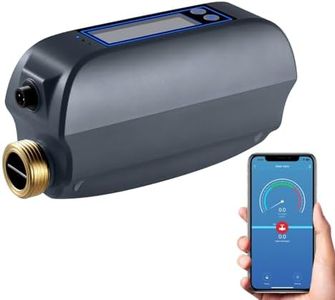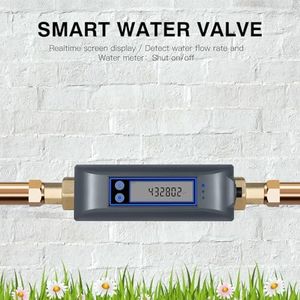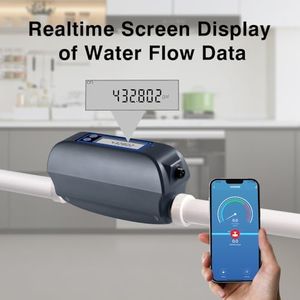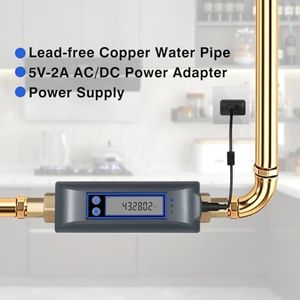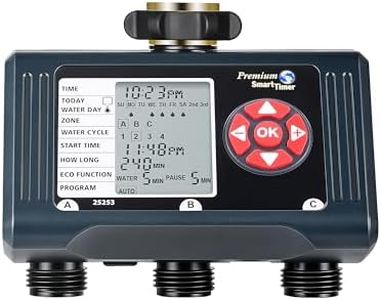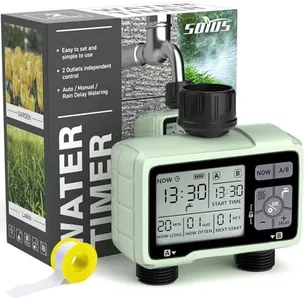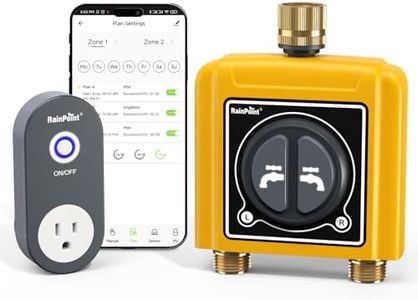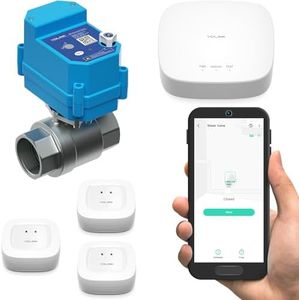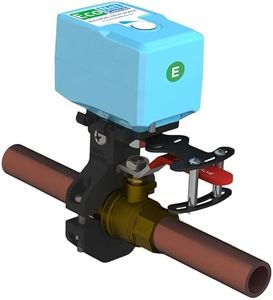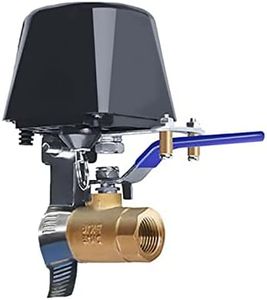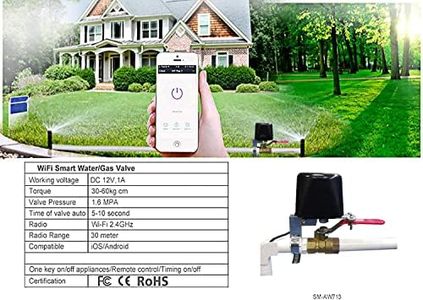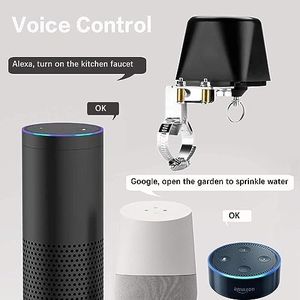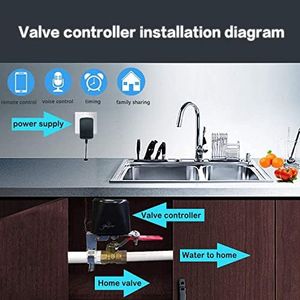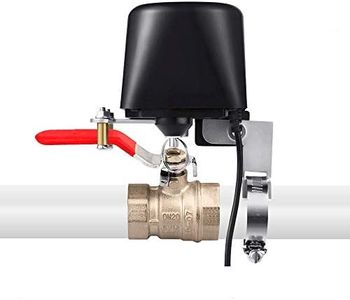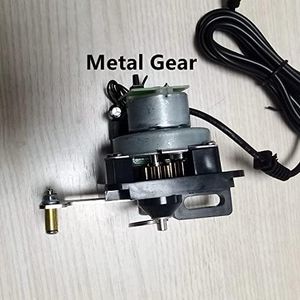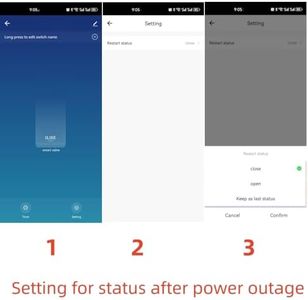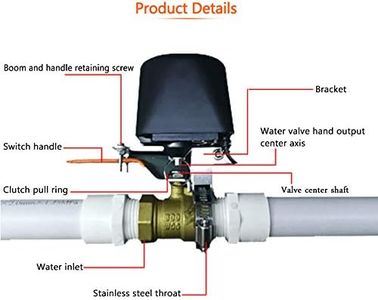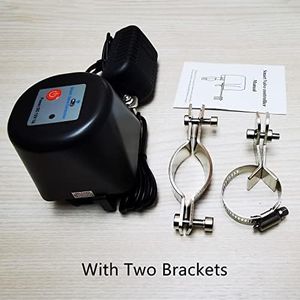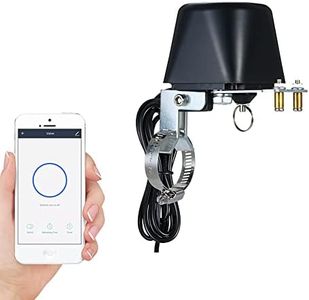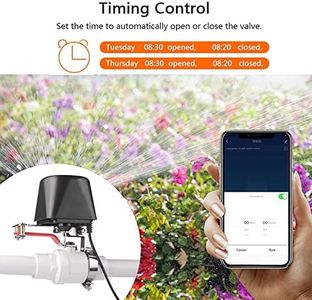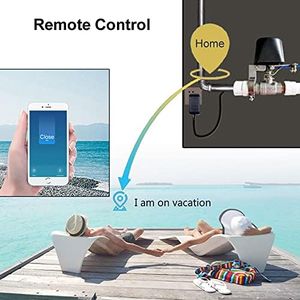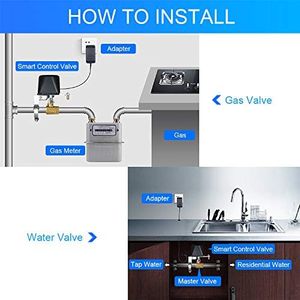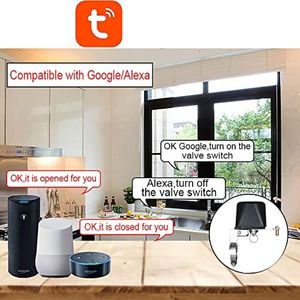10 Best Smart Water Valves 2025 in the United States
Winner
RAINPOINT WiFi Water Timer, Brass Inlet Smart Hose Faucet Timer, Automatic Irrigation System Controller for Yard Watering, APP Control via 2.4Ghz WiFi and Bluetooth (V2, 2025 Release)
The RAINPOINT WiFi Sprinkler Timer is a smart water valve designed to offer comprehensive control over your yard watering needs. One of its standout features is the durable brass inlet with a 360° swivel, which helps prevent water leaks and can withstand significant water pressure, ensuring long-term durability. Additionally, it includes a built-in metal filter to avoid blockages, enhancing its reliability.
Most important from
1152 reviews
YoLink DIY Automatic Water Leak Detection & Shut-Off Starter Kit, EVO Valve Operator, Wireless Valve Controller, (3) Leak Sensors, Hub
The YoLink DIY Automatic Water Leak Detection & Shut-Off Starter Kit is a comprehensive solution for homeowners looking to prevent costly water damage. One of its standout features is its compatibility with various smart home systems, which makes it easy to integrate with devices like security systems and smart locks. The package includes three leak sensors, a smart valve controller, and a hub, allowing for extensive coverage and control over leaks in your home.
Most important from
258 reviews
RAINPOINT WiFi Water Timer, Smart Sprinkler Timer Hose Timer WiFi Irrigation Controller, Wireless Watering System Valve, APP & Voice Control, Weather-Based Automatic Rain Delay, Brass Inlet
The RAINPOINT WiFi Water Timer offers a robust solution for managing your watering needs with several advanced features. Its brass water inlet enhances durability and can handle high water pressure, making it a reliable choice for long-term use. The timer connects exclusively to 2.4GHz WiFi, which may require some adjustment if you have a dual-band router, but it ensures stable connectivity for remote control via a user-friendly app.
Most important from
915 reviews
Top 10 Best Smart Water Valves 2025 in the United States
Winner
RAINPOINT WiFi Water Timer, Brass Inlet Smart Hose Faucet Timer, Automatic Irrigation System Controller for Yard Watering, APP Control via 2.4Ghz WiFi and Bluetooth (V2, 2025 Release)
RAINPOINT WiFi Water Timer, Brass Inlet Smart Hose Faucet Timer, Automatic Irrigation System Controller for Yard Watering, APP Control via 2.4Ghz WiFi and Bluetooth (V2, 2025 Release)
Chosen by 1398 this week
YoLink DIY Automatic Water Leak Detection & Shut-Off Starter Kit, EVO Valve Operator, Wireless Valve Controller, (3) Leak Sensors, Hub
YoLink DIY Automatic Water Leak Detection & Shut-Off Starter Kit, EVO Valve Operator, Wireless Valve Controller, (3) Leak Sensors, Hub
RAINPOINT WiFi Water Timer, Smart Sprinkler Timer Hose Timer WiFi Irrigation Controller, Wireless Watering System Valve, APP & Voice Control, Weather-Based Automatic Rain Delay, Brass Inlet
RAINPOINT WiFi Water Timer, Smart Sprinkler Timer Hose Timer WiFi Irrigation Controller, Wireless Watering System Valve, APP & Voice Control, Weather-Based Automatic Rain Delay, Brass Inlet
Zuomeng WiFi Smart Water Shutoff Valve with Leak Sensor, 3/4" Brass Valve & Extra Hose, Effortless Remote Control and Real-Time Water Leak Alerts via App
Zuomeng WiFi Smart Water Shutoff Valve with Leak Sensor, 3/4" Brass Valve & Extra Hose, Effortless Remote Control and Real-Time Water Leak Alerts via App
Haozee WiFi Smart Water Valve and Automatic Shutoff, Automation Scene Works with Leak Detector, Water Flow Meter,Built-in Rechargeable Battery, for DN20 3/4-Inch Diameter Pipe
Haozee WiFi Smart Water Valve and Automatic Shutoff, Automation Scene Works with Leak Detector, Water Flow Meter,Built-in Rechargeable Battery, for DN20 3/4-Inch Diameter Pipe
YoLink LoRa Smart Water Leak Protection System, Including 3/4" Commercial Grade Smart Motorized Stainless Steel Valve, (3) Water Leak Sensors, Hub: Up to 1/4-Mile Range, IFTTT, Alexa, Home Assistant
YoLink LoRa Smart Water Leak Protection System, Including 3/4" Commercial Grade Smart Motorized Stainless Steel Valve, (3) Water Leak Sensors, Hub: Up to 1/4-Mile Range, IFTTT, Alexa, Home Assistant
EcoNet Bulldog Smart Water Valve Controller – Z-Wave Plus Compatible – No Plumbing Required – DIY Install – Works with ¼ Turn Ball Valves – Z-Wave Hub Required
EcoNet Bulldog Smart Water Valve Controller – Z-Wave Plus Compatible – No Plumbing Required – DIY Install – Works with ¼ Turn Ball Valves – Z-Wave Hub Required
Smart WiFi Water Valve, APP Remote Control, Compatible with Alexa and Google Assistant, iOS/Android Apps, for Kitchen Gas Shutoff Valve, Farm Irrigation
Smart WiFi Water Valve, APP Remote Control, Compatible with Alexa and Google Assistant, iOS/Android Apps, for Kitchen Gas Shutoff Valve, Farm Irrigation
Motorized Smart Valve Watering Timer - WiFi & Bluetooth Electric Water Shutoff Controller Robot, Tuya & Smart Life App Control, Compatible With Alexa, No Hub Required
Motorized Smart Valve Watering Timer - WiFi & Bluetooth Electric Water Shutoff Controller Robot, Tuya & Smart Life App Control, Compatible With Alexa, No Hub Required
EVERSECU Tuya Smart WiFi & Bluetooth Smart Water Valve, Shutoff WiFi Control Water Valve Compatible with Alexa, Google and Application Program iOS/Android
EVERSECU Tuya Smart WiFi & Bluetooth Smart Water Valve, Shutoff WiFi Control Water Valve Compatible with Alexa, Google and Application Program iOS/Android
Our technology thoroughly searches through the online shopping world, reviewing hundreds of sites. We then process and analyze this information, updating in real-time to bring you the latest top-rated products. This way, you always get the best and most current options available.

